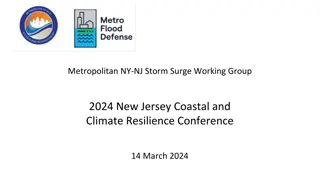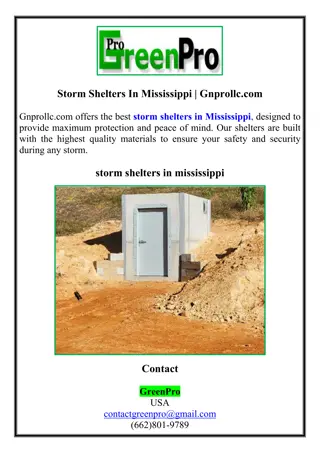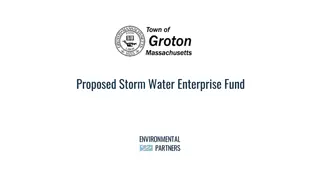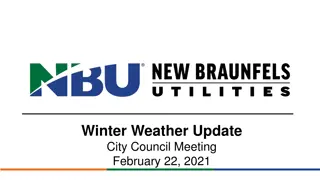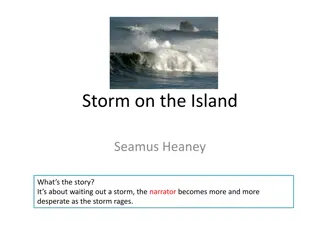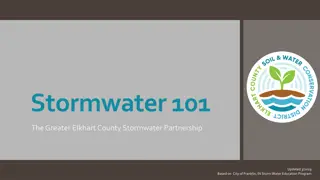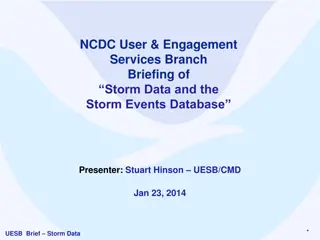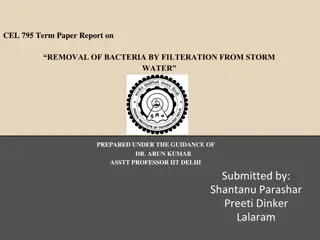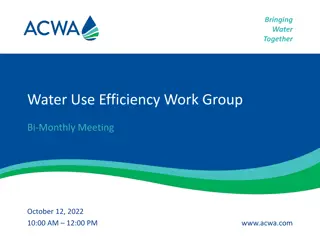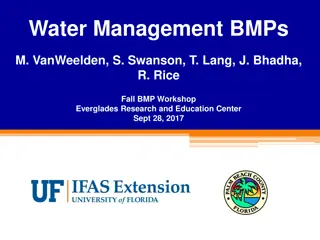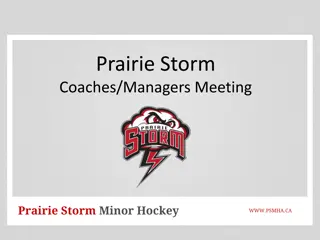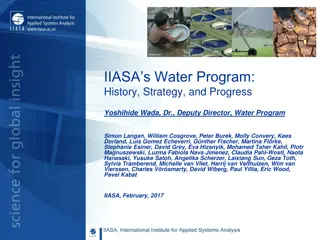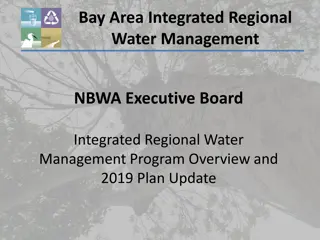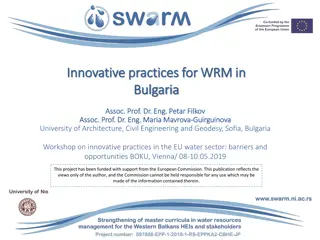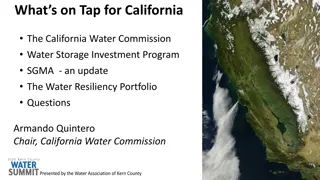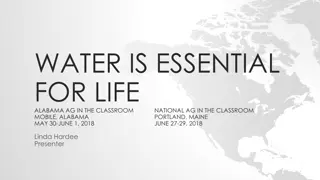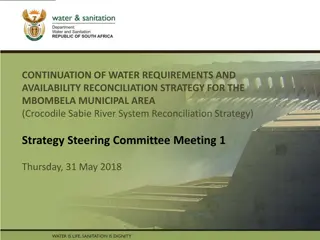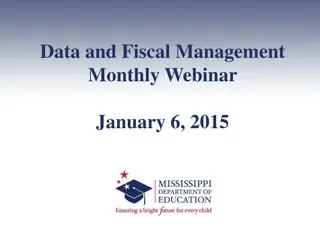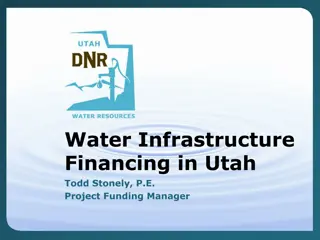Storm Water Management Program Overview - May 15th, 2014 Committee Meeting
This program overview from the Committee Meeting on May 15th, 2014 in New Braunfels covers the MS4 program, HCP, storm water permit updates, TPDES regulations, SWMP, permit requirements, and program implementation details including public education, illicit discharge detection, construction site runoff control, and post-construction storm water management.
Download Presentation

Please find below an Image/Link to download the presentation.
The content on the website is provided AS IS for your information and personal use only. It may not be sold, licensed, or shared on other websites without obtaining consent from the author. Download presentation by click this link. If you encounter any issues during the download, it is possible that the publisher has removed the file from their server.
E N D
Presentation Transcript
Implementing Committee Meeting May 15th, 2014 New Braunfels MS4 program and the HCP 1
Storm Water Permit Update Storm water regulations and the Texas Pollutant Discharge Elimination System (TPDES) Municipal Separate Storm Sewer System (MS4) Federally mandated permit and program requirements Storm Water Management Plan (SWMP) Minimum control measures and implementation 2
Permit Requirements Storm Water Management Program (SWMP) Submit Notice of Intent (NOI) Annual Reports 3
Program Requirements Storm Water Management Plan (SWMP) and Minimum Control Measures (MCM) 1. Public Education, Outreach, and Involvement 2. Illicit Discharge, Detection and Elimination 3. Construction Site Storm water Runoff Control 4. Post-Construction Storm water Management in New Development and Redevelopment 5. Pollution Prevention/Good Housekeeping for Municipal Operations 4
MCM 1: Public Education, Outreach and Involvement Best Management Practices: PE-1: Stormwater Educational Materials and Strategies PE-2: Public Participation and Involvement Programs PE- 3: Partnerships with Other Institutions and Organizations Alligator/Geronimo WPP, EA HCP, etc. PE-4: Presentation to Local Elementary Schools PE-5: Love your Park Volunteer Program PE-6: Tree City USA Program 5
MCM 2: Illicit Discharge Detection and Elimination Best Management Practices: ID-1: Storm Sewer Mapping ID-2: Detection and Elimination Program ID-3: Field Staff Training ID-4: Public Reporting of Illicit Discharges and Spills ID-5: Illicit Discharge Ordinance ID-6: River Cleanup 6
MCM 3: Construction Site Storm water Runoff Control Best Management Practices: CS-1: Construction Site Inspection Program CS-2: Construction Site Inventory CS-3: Construction Site Waste Control Ordinance CS-4: Construction Site Runoff Control Ordinance 7
MCM 4: Post-Construction Storm water Management in New Development and Redevelopment Best Management Practices: PC-1: Staff Training PC-2: Post-Construction Development Review Procedures evaluation/establishment of structural measures to enhance stormwater quality PC-3: Long-Term Operation and Maintenance PC-4: Storm water Management Ordinance for New Development and Redevelopment PC-5: Encouragement of Low Impact Development Designs PC-6: Establish No-Mow Zones 8
MCM 5: Pollution Prevention/Good Housekeeping for Municipal Operations Best Management Practices: GH-1: Operations and Maintenance: Street Sweeping GH-2: Mapping of Facilities and Inventory Control GH-3: Municipal Operations and Facility Survey GH-4: Facility Inspection Program GH-5: Good Housekeeping Operations Outdoor Storage GH-6: Fleet and Equipment Maintenance GH-7: Vehicle and Equipment Washing GH-8: Landscaping GH-9: Structural Control Maintenance GH-10: Spill Prevention and Response GH-11: Employee Training Program GH-12: Green Waste Management 9
Annual Report Requirements The report must include: Status of compliance; Summary of results analyzed; Summary of activities; Proposed changes to SWMP; Description and schedule for additional BMP implementation; and Any agreements with other MS4s. Source: TPDES General Permit No. TXR040000 10
Impacts Residential and Development Existing Residential homes and lots No impact New and Redevelopment ( 1 acre) Construction SWPPP still required First .5 rain water quality requirement (Drainage Criteria Manual anticipated update) 11
Manpower requirements Positions Watershed Manager Watershed Coordinator Inspector Admin FTE s 0.50 0.50 1.50 0.50 Total FTE s needed to support MS4 program 3.00 12
Cost Analysis (yearly) MCM FTE cost $23,160 $26,045 $45,760 $54,460 $45,320 $14,955 $209,700 Fixed Cost $5,000 $45,000 $0 $0 $15,000 $0 $65,000 1 (Education) 2 (Illicit Discharge) 3 (Constr. Runoff) 4 (Development) 5 (Housekeeping) Report Total Costs: TOTAL OVERALL COST: $274,700.00 13
Low Impact Development (LID) & MS4 What is LID? LID in the HCP is an incentives based program that allows citizens to participate in improving the quality of the runoff that occurs in and around watersheds draining to Landa Lake. How does LID in the HCP differ from MS4? LID program in the HCP concentrates on opportunities for stormwater quality enhancement in areas draining to critical habitats. The MS4 program is a city wide city funded program. 14
LID focus Public education is focused on citizens within watersheds draining to critical habitats Long term establishment of program efficiencies based on water quality monitoring Rebate program for LID features in areas just upstream of critical habitats Website development of the habitat and LID education relationship Pilot and Test projects BMP s New technologies for improving water quality 15
http://www.haywood.edu/UserFiles/natural_resources_management/LIDSedimentsResidential.jpghttp://www.haywood.edu/UserFiles/natural_resources_management/LIDSedimentsResidential.jpg 16
Impervious Cover / Water Quality / LID Budget Table 7.1 2014 WP $ 100,000 $ 100,000 No identified decisions or deviations
Impervious Cover / Water Quality (WQ) / Low Impact Development (LID) 2013 work plan activities Beginning stages of the creation of the overall LID plan through public involvement and meetings with City of New Braunfels 2014 work plan Further development of LID/WQ program in watersheds draining to critical habitats Implementation of the LID/BMP program utilizing public involvement and feedback
QUESTIONS ? 19


